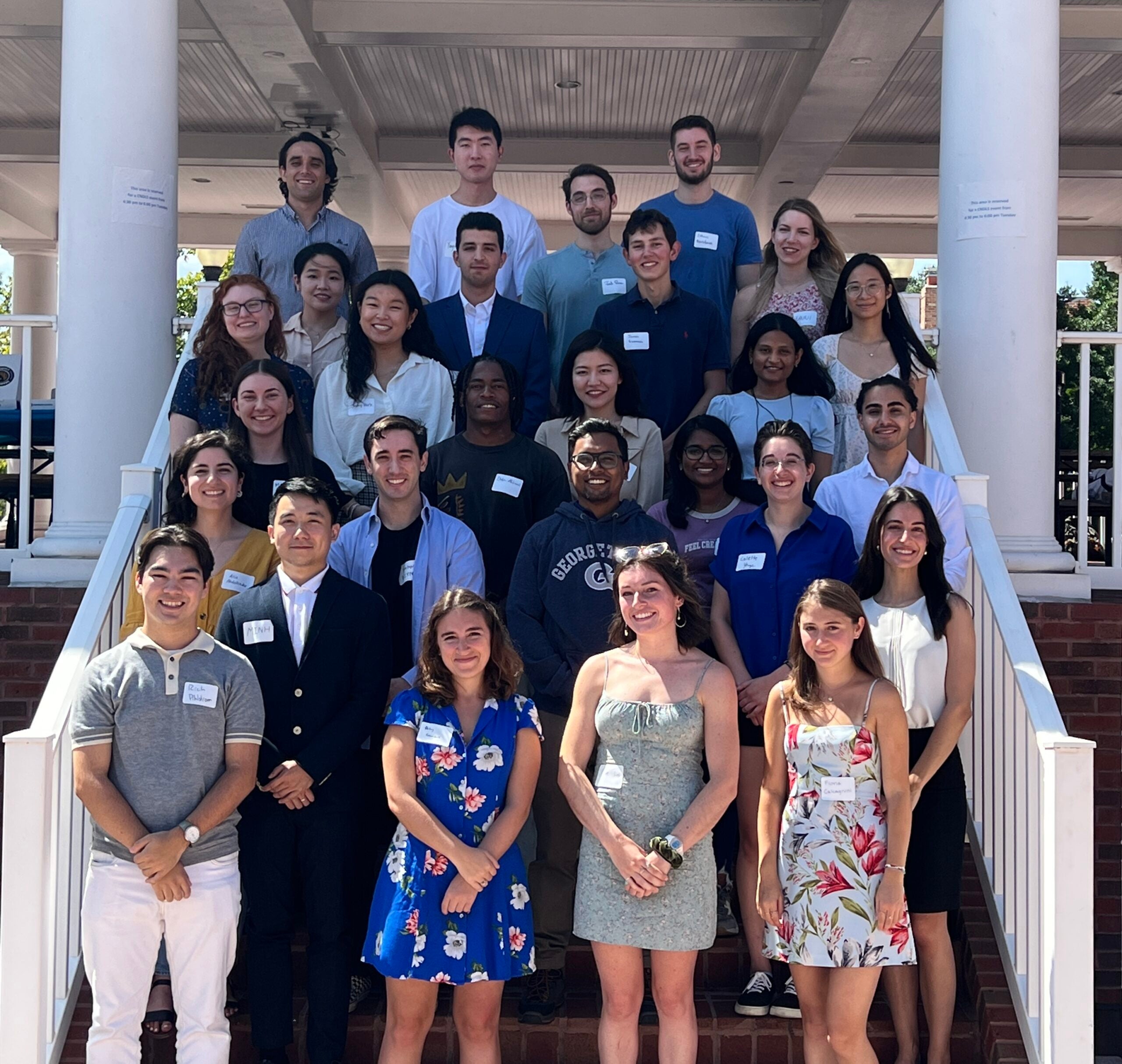MDI Scholars Fall 2022 Research Showcase
On December 7th, 2022 from 1:00-2:30 pm followed by a reception from 2:30-3:30 pm in the Social Room in the Healey Family Student Center at Georgetown University, the Fall 2022 MDI Scholars will be presenting their projects.
There will be formal remarks, followed by student project team “flash talks” — a 60-second summary of their research projects. In addition, you’ll be able to hear from the MDI Scholars project teams about their research on their posters.
RSVP is not required. This event is following Georgetown University guidelines https://www.georgetown.edu/public-health-alert-coronavirus/event-and-visitor-guidelines/ Guests outside of the GU community, we request that you complete the necessary COVID form: https://gucovid.force.com/visitor/s/?event=VE6334.
About the MDI Scholars Program: The MDI Scholars program is an experiential learning opportunity for undergraduate and Master’s students to work on interdisciplinary research projects with professors and practitioners. These projects connect new forms of data and/or large-scale computing infrastructure to different public policy questions.
About the Massive Data Institute (MDI): MDI is an interdisciplinary research institute that connects experts across computer science, data science, public health, public policy, and social science to tackle societal scale issues and impact public policy in a way that improves people’s lives through responsible evidence-based research.
MDI Scholar Projects (Poster Titles as of November 14, 2022)
Semi-Supervised Topic Modeling to Understand Different Textual Data Streams
Hanjing Shi, Georgetown School of Arts & Sciences, Data Science and Analytics ’23
Yongrui Chen, Georgetown School of Arts and Sciences, Data Science and Analytics ’22
Abby Fremaux, Georgetown School of Arts & Sciences, Data Science and Analytics ’23
Collaborator(s): Dr. Lisa Singh, D. Carole Roan Gresenz, and Yanchen Wang
Determining the Spread of Scientific Misinformation Related to AI, Climate Change, and Vaccines
Fiona Calcagnini, Georgetown College, Computer Science and Economics ’23
Justin Goldstein, Georgetown College, Computer Science ’24
Rich Pihlstrom, Georgetown College, Computer Science ’24
Collaborator(s): Dr. Lisa Singh. Dr. Dewey Murdick, Autumn Toney, and Kornraphop Kawintiranon (Ken)
Partner Organization: Center for Security and Emerging Technology (CSET)
KL Divergence Evaluation for Accelerated Bayesian Inference
Linpei Zhang, Georgetown School of Arts & Sciences, Data Science and Analytics ’23
Collaborator(s): Dr. Nathan Wycoff
A Geospatial Understanding of Evictions in Franklin County, Ohio
Monroe Farris, Georgetown School of Arts & Sciences, Data Science and Analytics ’23
Collaborator(s): Dr. Amy O’Hara
Partner Organization: Georgetown’s Civil Justice Data Commons (CJDC)
Fostering Civil Justice Through Court Data Eviction Findings
Jordan Rinaldi, Georgetown College, Mathematics and Data Science and Analytics ’23
Collaborator(s): Dr. Amy O’Hara, James Carey, Ellen Moriarty
Partner Organization: Civil Justice Data Commons
American Community Survey: design and data sources
Audrey McIntyre, McCourt School of Public Policy, Data Science for Public Policy ’23
Collaborator(s): Dr. Amy O’Hara, Lahy Amman
Early infrastructure in the CJDC: standardizing the pipeline and building demos
Ahmad Jandal, Science, Technology, International Affairs, Concentration in Security, Minor in Mandarin & Computer Science ’23
Josh Rosen, McCourt School of Public Policy, Data Science for Public Policy ’23
Collaborator(s): Dr. Amy O’Hara, James Carey, Ellen Moriarty
Understanding Ukrainian Movement Patterns Using Organic Data
Didier Akilimali, Georgetown College, Computer Science ’23
Aidan Pizzo, Georgetown College, Mathematics ’23
Sonali Rathinam, McCourt School of Public Policy, Data Science for Public Policy ’23
Collaborator(s): Dr. Lisa Singh, Dr. Katharine Donato, Dr. Ali Arab, and Dr. Nathan Wycoff
Using Lexicon and Machine Learning-Based Models for Sentiment Analysis Across Languages to Predict Migration Routes
Jenny Park, Georgetown College, Computer Science, and Justice and Peace Studies ’24
Qihang Wang, Georgetown School of Arts & Sciences, Data Science and Analytics ’23
Collaborator(s): Dr. Lisa Singh, Dr. Ameeta Agrawal, and Yaguang Liu
Using Estimated Ideology for Prediction in the Midterm Elections
Ryan Ripper, McCourt School of Public Policy, Data Science for Public Policy ’23
Colette Yeager, McCourt School of Public Policy, Master of Science in Data Science for Public Policy ’23
Collaborator(s): Dr. Michael Bailey, Sean Ye, and Alex Seitel
Developing Spatial Data Tools to Investigate Safe Drinking Water Access
Phillip Cork, McCourt School of Public Policy, Data Science for Public Policy ’23
Collaborator(s): Dr. Michael Bailey
Spatial and demographic patterns of building-level emissions in Washington D.C.
Sean Conner, McCourt School of Public Policy, Master of Public Policy ’23
Kumar Himangshu, McCourt School of Public Policy, Data Science for Public Policy ’24
Collaborator(s): Dr. Christopher Dick and Dr. Michael Bailey
Governmental Data Accessibility and Usability: Analyzing Federal Water Spending
Nikhila Iyer, McCourt School of Public Policy, Data Science for Public Policy ’23
Ethan Rosenbaum, McCourt School of Public Policy, Master of Public Policy ’23
Collaborator(s): Dr. Michael Bailey
Partner Organization: Environmental Policy Innovation Center
Decennial census-based demographics modeling
Minh Quach, McCourt School of Public Policy, Data Science for Public Policy ’24
Fanni Varhelyi, McCourt School of Public Policy, Data Science for Public Policy ’24
Collaborator(s): Dr. Christopher Dick, and Dr. Michael Bailey
Accessible and Customizable Environmental Data Visualizations for Researchers and Policymakers
Ellis Obrien, McCourt School of Public Policy, Data Science for Public Policy ’23
Collaborator(s): Dr. Michael Bailey
Toxic waste and Prince George’s County public schools
Ethan Rodriguez-Shah, McCourt School of Public Policy, Data Science for Public Policy ’24
Collaborator(s): Dr. Christopher Dick, and Dr. Michael Bailey
Toxic Waste and Race in 2020: Revisiting the 1987 Report
Shaila Sundram, McCourt School of Public Policy, Data Science for Public Policy ’23
Collaborator(s): Dr. Michael Bailey
Supporting Efficient Federal Program Operations:Automating the LIHEAP Funding Formula
Alia Abdelkader, McCourt School of Public Policy, Data Science for Public Policy ’23
Caroline Adams, McCourt School of Public Policy, Data Science for Public Policy ’23
Collaborator(s): Dr. Michael Bailey
Partner Organization: Department of Health and Human Services Administration for Children and Families, Office of Community Service
Who Should Count as an Expert in Students’ Needs? Text as Data to Analyze Discussions of Parents’ Rights in K-12 Education
Natalie Smith, Georgetown School of Arts & Sciences, Data Science and Analytics ’24
Abigail Wolfe, McCourt School of Public Policy, Data Science for Public Policy ’23
Collaborator(s): Dr. Rebecca Johnson
Death, Inequality and the Pandemic in the Nation’s Capital
Sai Srujana Illa, McCourt School of Public Policy, Data Science for Public Policy ’23
Collaborator(s): Dr. Maria Alva, Dr. Jaren R. Haber, and Dr. Lisa Singh
Cost-Effectiveness of Continuous Glucose Monitoring as a Preventive Tool Among Healthy Adult Population
Shakhzod Yuldoshboev, School of Foreign Service in Qatar, International Economics ’23
Collaborator(s): Dr. Maria Alva

